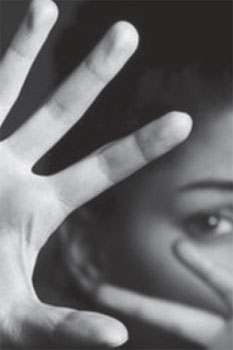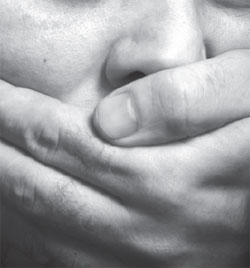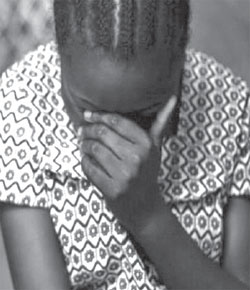
 Ending rape culture is our issue because men are responsible for freeing men from gender ideals of dominance and control through violence. Ending rape culture is our issue because men are responsible for freeing men from gender ideals of dominance and control through violence.
This was the central theme of a workshop held in commemoration of International Men’s Day (IMD), observed worldwide on November 19, and at the IGDS/Canada Hall workshop, Red Card Rape Culture.
The workshop brought young men from 10 CARICOM countries, all living on the St Augustine Campus, into a conversation meant to cross the region. This was just one of more needed in the de-patriarchal movement to break systems of male domination over women.
For all of us in the room with the Canada Hall men, eager to reason and engage as young men do, it was important to build commitment to the ideal man. Participants were asked to produce messages that defined their own sense of men’s responsibility.
The posters read:
A man is like a taxi driver,
he knows when to stop
Women should not live in fear,
how she’s dressed does not mean yes
If she says no, get up and go
No doesn’t mean yes
These messages were distributed across social media and in posters around the campus as part of the goal of transforming masculinities and campus life.
As a university, we house the minds of emerging Caribbean leaders, especially young men who will assume critical leadership roles and status in the future. In our thrust, we must offer an education that can also advance a pedagogy of unlearning, especially in relation to toxic masculinity, as part of masculine transformation in order to redefine the terms in new ways.
 In an earlier phase of our independence, we turned to the larger than life male figures of elite Caribbean leadership for self-definition; the “best and the brightest” among us to steer the direction of our societies. The fact is that ‘one-manism,’ messianic and authoritarian leadership that bear striking resemblances to the colonial ruling style we hoped to have banished away, still plague us. In an earlier phase of our independence, we turned to the larger than life male figures of elite Caribbean leadership for self-definition; the “best and the brightest” among us to steer the direction of our societies. The fact is that ‘one-manism,’ messianic and authoritarian leadership that bear striking resemblances to the colonial ruling style we hoped to have banished away, still plague us.
Among populations, there is a persistent feeling that political leadership has failed us. There is greater push-back against the notion of a strongman leader, hammering through weak institutions undemocratically.
With social media, there is even a greater pushback against misogynist utterances and language that blame women for rape. Gender has been at the heart of the political and cultural debates of our time and Caribbean voices have been speaking out. Women have always been at the forefront of these movements but male centred writings of history have ways of keeping them in the backroom.
The growing visibility of women in middle management, university undergraduate enrolment and career advances in some traditionally male-dominated sectors may give us the sense of arrival at the point of gender equality. While these structural changes have led to more women accessing social status and economic power in formations, they are the direct result of women and activists’ advocacy for over three decades.
 A number of men’s rights movements and male action groups have sprung up in response to the increasing visibility of women and articulate a counterproductive anti-feminist politics. The battle of the sexes is war often created on the terms of men who believe that human dignity, justice and the economy are made up of scarce resources. It is for precisely this reason that The UWI must engage in public debates on culture and the economy to interrogate the ideological underpinnings in policy and popular discourses. A number of men’s rights movements and male action groups have sprung up in response to the increasing visibility of women and articulate a counterproductive anti-feminist politics. The battle of the sexes is war often created on the terms of men who believe that human dignity, justice and the economy are made up of scarce resources. It is for precisely this reason that The UWI must engage in public debates on culture and the economy to interrogate the ideological underpinnings in policy and popular discourses.
How can we reimagine and redefine masculinity away from ideals of dominance, violence and control and closer to care, commitment and critical confidence? The ideal man is a leader committed to social and gender justice. He exercises leadership in his life and the decisions he makes to improve the well-being of others, not only himself. A key attribute of this man is his ability to determine his definition of masculinity and the man he wants to be. When concerned citizens sit in a room and think about the future of the region, one might ask, “Who will make the Caribbean a better place?” “That man is one of them.” That is what it means to be the ideal man.
As a feminist, I maintain that addressing men’s needs and gender equality work are not oppositional projects. IMD provides an optimal moment each year for men to reflect and raise their political consciousness about their duty to rebel against oppressions that imprison men and women and transform these inequalities to promote a more just society.
Our destiny will not be determined by our economic situation, GDP growth rates or the ability to attract currency from geographies far away. It is our intellectual and cultural independence that will build our Caribbean civilization.
Amílcar Sanatan is a Research Assistant at the Institute for Gender and Development Studies, St Augustine Campus |





